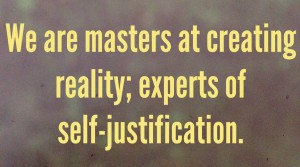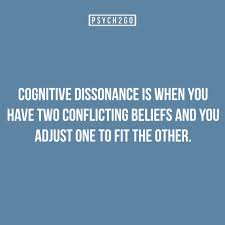 People are driven by their egos. We form an identity at a young age, and with that identity comes a self-concept and a self-image. These are constructed out of our beliefs and the way that we see ourselves.
People are driven by their egos. We form an identity at a young age, and with that identity comes a self-concept and a self-image. These are constructed out of our beliefs and the way that we see ourselves.
We believe these identities and concepts to be that of a good person. If you stopped and thought about who you are as a person, you would probably think that you are a good person. That, yes you might mess up here or there, but all in all you’re a good person who is doing their best. In fact, some of those times that you were making mistakes probably weren’t really your fault were they? We believe that we view the world in a realistic manner and that our actions are rational, but this isn’t the case. Those times that we made mistakes, they were our own doing, and we made them, but we don’t like to admit that.
Occasionally our actions or thoughts clash with what your self-concept thinks we should be doing. This is called cognitive dissonance. Cognitive dissonance is a form of mental discomfort and tension. This happens when we try to hold two conflicting attitudes at the same time.
Our minds want consonance and clarity all of the time, and it hates when it conflicts with itself. When this happens we immediately begin to seek a solution to make the cognitive dissonance disappear.
 This is how we end up justifying our actions. When we do something that goes against what we believe a good person would do, we often justify it by saying we wouldn’t have done it if it weren’t for the circumstances that we were in, or that we were forced into it. We either have to admit our mistake or we make justifications to ease the cognitive dissonance.
This is how we end up justifying our actions. When we do something that goes against what we believe a good person would do, we often justify it by saying we wouldn’t have done it if it weren’t for the circumstances that we were in, or that we were forced into it. We either have to admit our mistake or we make justifications to ease the cognitive dissonance.
Self-justification is designed to keep your self-concept and self-esteem intact by reducing your responsibility for the mistake or failure. We use self-justification every day of our lives, mostly in small ways, and everyone does it. It’s something we have to be aware of.
Usually we don’t realize it’s happening. It’s wise to start making a point to be aware of when you self-justify. Take a step back and look at all sides of the situation. Our self-justification makes small adjustments all day long, and we need to become aware of when this happens in order to change.
Noticing when self-justification happens allows us to make the changes that we need to in order to understand when we have made mistakes in our lives. Realizing self-justification helps us own our mistakes and become better people.
